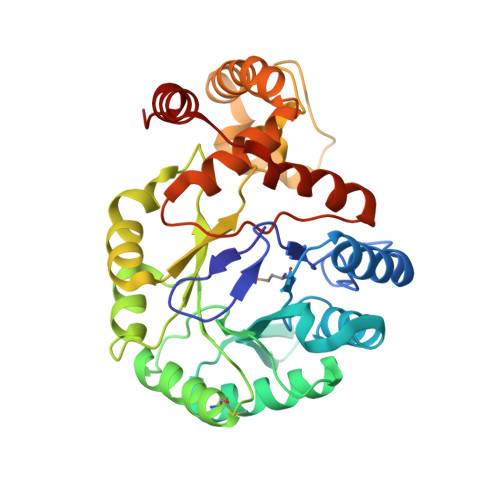Structural and Catalytic Diversity in the Two Family 11 Aldo-keto Reductases
Ehrensberger, A.H., Wilson, D.K.(2004) J Mol Biology 337: 661-673
- PubMed: 15019785
- DOI: https://doi.org/10.1016/j.jmb.2004.01.059
- Primary Citation of Related Structures:
1PYF, 1PZ0, 1PZ1 - PubMed Abstract:
Aldo-keto reductases (AKRs) are a large superfamily of NAD(P)H-dependent enzymes that function in a wide range of biological processes. The structures of two enzymes from the previously uncharacterized family 11 (AKR11A and AKR11B), the products of the iolS and yhdN genes of Bacillus subtilis have been determined. AKR11B appears to be a relatively conventional member of the superfamily with respect to structural and biochemical properties. It is an efficient enzyme, specific for NADPH and possesses a catalytic triad typical for AKRs. AKR11A exhibits catalytic divergence from the other members of the superfamily and, surprisingly, AKR11B, the most closely related aldo-keto reductase in sequence. Although both have conserved catalytic residues consisting of an acidic tyrosine, a lysine and an aspartate, a water molecule interrupts this triad in cofactor-bound AKR11A by inserting between the lysine and tyrosine side-chains. This results in a unique architecture for an AKR active site with scant catalytic power. In addition, the absence of a bulky tryptophan side-chain in AKR11A allows an unconventional conformation of the bound NADP+ cosubstrate, raising the possibility that it donates the 4-pro-S hydride rather than the 4-pro-R hydride seen in most other AKRs. Based upon the architecture of the active site and the resulting reaction velocities, it therefore appears that functioning as an efficient oxido-reductase is probably not the primary role of AKR11A. A comparison of the apo and holo forms of AKR11A demonstrates that the cosubstrate does not play the dramatic role in active site assembly seen in other superfamily members.
- Section of Molecular and Cellular Biology, University of California, Davis, CA 95616, USA.
Organizational Affiliation:



















